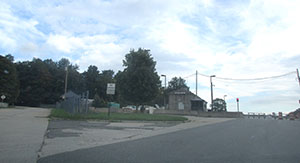DEP Working Toward Start of New Water Tunnel Construction for 2024
A nearly two-mile-long tunnel is being planned by the New York City Department of Environmental Protection (DEP) to carry water between the Eastview ultraviolet facility to its Kensico Reservoir campus in Valhalla.
The DEP is conducting environmental reviews for what will be one of the world’s largest water tunnels, measuring 27 feet in diameter and extending 10,325 feet that will allow the agency greater flexibility in performing maintenance work on its connections as well as preparing for future potential increases in demand, said Adam Bosch, director of public affairs for the DEP.

There has been declining usage since the 1980s, but the city must prepare for additional demand in the decades ahead, he said.
Work is part of a $1.5 billion decade-long, multifaceted project that is tentatively scheduled to commence in 2024, pending approvals from various regulatory agencies at every level of government, Bosch said.
The water needs to flow from the reservoir to the ultraviolet facility, where it is disinfected, to customers in New York City and southern Westchester. About 9.8 million people, a little more than half of New York State, use city water, he said.
“This bigger tunnel, this additional tunnel will allow us to meet demand for not only New York City but Westchester County, taps into our reservoirs either at Kensico or points to the south,” he said. “It will provide some flexibility, as I say, in how we carry water between these two important facilities between Kensico and the UV facilities that will allow for shutdowns or facilitate emergency or planned outages.”
The cost will be shouldered by ratepayers, Bosch mentioned.
While construction of the tunnel, which will be placed 400 to 500 feet underground, is the centerpiece of the project, there are other significant portions of the work as well. A new screen chamber must be installed, which will prevent trees and other debris from entering the tunnel.
There would also be shoreline stabilization performed at the reservoir to protect it from deterioration during severe storms, Bosch said.
Other changes include a new electrical building on the Valhalla campus for the DEP to store its equipment, relocating Westlake Drive and building a roughly 20-space parking lot for Valhalla High School because on-street parking on Westlake that is used nearly exclusively by students will be eliminated. That work will be completed first so there is no chance the student drivers and pedestrians will interfere with crews as the project gets underway.
Finally, there will be new fencing and a police booth at Valhalla.
Bosch said the tunneling will start on the Eastview side because it is nearly exclusively commercial or industrial, while Valhalla is far more residential. There is also better access to highways near Eastview to truck the material away, he said.
“Where you start the tunnel is where you manage all the pulverized rock and you have a lot more truck traffic there as you pull that rock off the site,” Bosch said.
The Environmental Impact Statement that the DEP is required to complete will focus on construction traffic volume and dust mitigation around the sites and on adjoining roads, he said.
The DEP manages the largest water supply in the United States, where water is derived from a network of 19 reservoirs and three lakes. Kensico is arguably the most critical of the reservoirs because it is here the entire system’s unfiltered water supply is stored, Bosch said.
“So Kensico is extremely important to us,” Bosch said. “It is the point of regulation for New York City’s water supply, so all the regulations related to our unfiltered system are managed at Kensico.”

Martin has more than 30 years experience covering local news in Westchester and Putnam counties, including a frequent focus on zoning and planning issues. He has been editor-in-chief of The Examiner since its inception in 2007. Read more from Martin’s editor-author bio here. Read Martin’s archived work here: https://www.theexaminernews.com/author/martin-wilbur2007/
